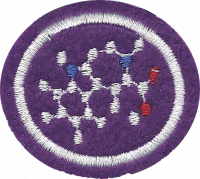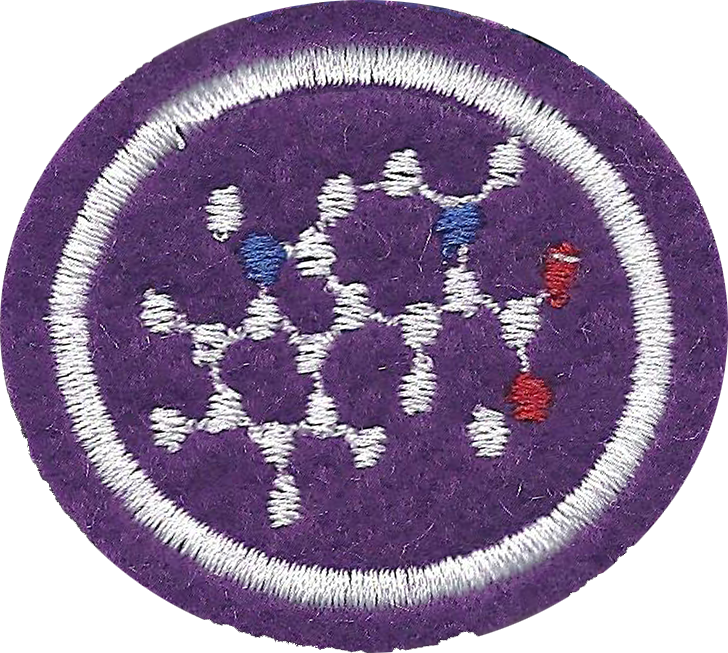Difference between revisions of "AY Honors/Biochemistry/Requirements"
Jomegat bot (talk | contribs) (Bot: Automated import of articles) |
m (- Category of Honor Requirements) |
||
| (11 intermediate revisions by 2 users not shown) | |||
| Line 1: | Line 1: | ||
| − | < | + | {{HonorSubpage}} |
| − | <noinclude><translate></noinclude> | + | |
| − | == | + | <section begin=Body /> |
| − | + | ||
| − | + | <b>1. <section begin=req1 /><noinclude><translate><!--T:1--> | |
| − | + | </noinclude>Define the following terms: | |
| − | + | <noinclude></translate></noinclude><section end=req1 /></b> | |
| − | + | ||
| − | + | :<b>a. <section begin=req1a /><noinclude><translate><!--T:2--> | |
| − | + | </noinclude>Carbohydrates | |
| − | + | <noinclude></translate></noinclude><section end=req1a /></b> | |
| − | + | ||
| − | + | :<b>b. <section begin=req1b /><noinclude><translate><!--T:3--> | |
| − | + | </noinclude>Lipid | |
| − | + | <noinclude></translate></noinclude><section end=req1b /></b> | |
| − | + | ||
| − | + | :<b>c. <section begin=req1c /><noinclude><translate><!--T:4--> | |
| − | + | </noinclude>Fatty acid | |
| − | + | <noinclude></translate></noinclude><section end=req1c /></b> | |
| − | + | ||
| − | + | :<b>d. <section begin=req1d /><noinclude><translate><!--T:5--> | |
| − | + | </noinclude>Protein | |
| − | + | <noinclude></translate></noinclude><section end=req1d /></b> | |
| − | + | ||
| − | + | :<b>e. <section begin=req1e /><noinclude><translate><!--T:6--> | |
| − | + | </noinclude>Peptide | |
| − | + | <noinclude></translate></noinclude><section end=req1e /></b> | |
| − | + | ||
| − | + | :<b>f. <section begin=req1f /><noinclude><translate><!--T:7--> | |
| − | + | </noinclude>Enzyme | |
| − | + | <noinclude></translate></noinclude><section end=req1f /></b> | |
| − | + | ||
| − | <noinclude></translate></noinclude> | + | :<b>g. <section begin=req1g /><noinclude><translate><!--T:8--> |
| + | </noinclude>Amino acid | ||
| + | <noinclude></translate></noinclude><section end=req1g /></b> | ||
| + | |||
| + | :<b>h. <section begin=req1h /><noinclude><translate><!--T:9--> | ||
| + | </noinclude>Nucleic acid | ||
| + | <noinclude></translate></noinclude><section end=req1h /></b> | ||
| + | |||
| + | :<b>i. <section begin=req1i /><noinclude><translate><!--T:10--> | ||
| + | </noinclude>Hydrophilic and hydrophobic | ||
| + | <noinclude></translate></noinclude><section end=req1i /></b> | ||
| + | |||
| + | :<b>j. <section begin=req1j /><noinclude><translate><!--T:11--> | ||
| + | </noinclude>Triglyceride | ||
| + | <noinclude></translate></noinclude><section end=req1j /></b> | ||
| + | |||
| + | :<b>k. <section begin=req1k /><noinclude><translate><!--T:12--> | ||
| + | </noinclude>Monosaccharide | ||
| + | <noinclude></translate></noinclude><section end=req1k /></b> | ||
| + | |||
| + | <b>2. <section begin=req2 /><noinclude><translate><!--T:13--> | ||
| + | </noinclude>What is the importance of water in organisms? What are the main physical and chemical characteristics of the water molecule? | ||
| + | <noinclude></translate></noinclude><section end=req2 /></b> | ||
| + | |||
| + | <b>3. <section begin=req3 /><noinclude><translate><!--T:14--> | ||
| + | </noinclude>What does metabolism mean? | ||
| + | <noinclude></translate></noinclude><section end=req3 /></b> | ||
| + | |||
| + | <b>4. <section begin=req4 /><noinclude><translate><!--T:15--> | ||
| + | </noinclude>Biochemically, why do we feel hungry? | ||
| + | <noinclude></translate></noinclude><section end=req4 /></b> | ||
| + | |||
| + | <b>5. <section begin=req5 /><noinclude><translate><!--T:16--> | ||
| + | </noinclude>Explain how the glucose pathway occurs. | ||
| + | <noinclude></translate></noinclude><section end=req5 /></b> | ||
| + | |||
| + | <b>6. <section begin=req6 /><noinclude><translate><!--T:17--> | ||
| + | </noinclude>Which human cells depend only on this pathway for energy? | ||
| + | <noinclude></translate></noinclude><section end=req6 /></b> | ||
| + | |||
| + | <b>7. <section begin=req7 /><noinclude><translate><!--T:18--> | ||
| + | </noinclude>Which molecule links the glucose pathway and the Krebs Cycle? | ||
| + | <noinclude></translate></noinclude><section end=req7 /></b> | ||
| + | |||
| + | <b>8. <section begin=req8 /><noinclude><translate><!--T:19--> | ||
| + | </noinclude>What is the importance of the Krebs Cycle? | ||
| + | <noinclude></translate></noinclude><section end=req8 /></b> | ||
| + | |||
| + | <b>9. <section begin=req9 /><noinclude><translate><!--T:20--> | ||
| + | </noinclude>What is the function of lipids? | ||
| + | <noinclude></translate></noinclude><section end=req9 /></b> | ||
| + | |||
| + | <b>10. <section begin=req10 /><noinclude><translate><!--T:21--> | ||
| + | </noinclude>Why are lipids insoluble in water? | ||
| + | <noinclude></translate></noinclude><section end=req10 /></b> | ||
| + | |||
| + | <b>11. <section begin=req11 /><noinclude><translate><!--T:22--> | ||
| + | </noinclude>Why are lipids, and not glucose, used for energy storage? | ||
| + | <noinclude></translate></noinclude><section end=req11 /></b> | ||
| + | |||
| + | <b>12. <section begin=req12 /><noinclude><translate><!--T:23--> | ||
| + | </noinclude>What is beta oxidation? Why does this pathway receive this name? | ||
| + | <noinclude></translate></noinclude><section end=req12 /></b> | ||
| + | |||
| + | <b>13. <section begin=req13 /><noinclude><translate><!--T:24--> | ||
| + | </noinclude>What are essential and non-essential amino acids? | ||
| + | <noinclude></translate></noinclude><section end=req13 /></b> | ||
| + | |||
| + | <b>14. <section begin=req14 /><noinclude><translate><!--T:25--> | ||
| + | </noinclude>What are ketone bodies, where are they produced, and what are the consequences of excess production? | ||
| + | <noinclude></translate></noinclude><section end=req14 /></b> | ||
| + | |||
| + | <b>15. <section begin=req15 /><noinclude><translate><!--T:26--> | ||
| + | </noinclude>What compounds are formed by the binding of amino acids? What are the main functions of these compounds? | ||
| + | <noinclude></translate></noinclude><section end=req15 /></b> | ||
| + | |||
| + | <b>16. <section begin=req16 /><noinclude><translate><!--T:27--> | ||
| + | </noinclude>What is the importance of nucleic acids? What is its structure like and what are its components? | ||
| + | <noinclude></translate></noinclude><section end=req16 /></b> | ||
| + | |||
| + | <section begin=challenge /> | ||
| + | <b>17. <section begin=req17 /><noinclude><translate><!--T:28--> | ||
| + | </noinclude>Draw a DNA molecule, with four nucleotides, naming its components. | ||
| + | <noinclude></translate></noinclude><section end=req17 /></b> | ||
| + | <section end=challenge /> | ||
| + | <section end=Body /> | ||
Latest revision as of 20:49, 20 July 2022
1. Define the following terms:
- a. Carbohydrates
- b. Lipid
- c. Fatty acid
- d. Protein
- e. Peptide
- f. Enzyme
- g. Amino acid
- h. Nucleic acid
- i. Hydrophilic and hydrophobic
- j. Triglyceride
- k. Monosaccharide
2. What is the importance of water in organisms? What are the main physical and chemical characteristics of the water molecule?
3. What does metabolism mean?
4. Biochemically, why do we feel hungry?
5. Explain how the glucose pathway occurs.
6. Which human cells depend only on this pathway for energy?
7. Which molecule links the glucose pathway and the Krebs Cycle?
8. What is the importance of the Krebs Cycle?
9. What is the function of lipids?
10. Why are lipids insoluble in water?
11. Why are lipids, and not glucose, used for energy storage?
12. What is beta oxidation? Why does this pathway receive this name?
13. What are essential and non-essential amino acids?
14. What are ketone bodies, where are they produced, and what are the consequences of excess production?
15. What compounds are formed by the binding of amino acids? What are the main functions of these compounds?
16. What is the importance of nucleic acids? What is its structure like and what are its components?
17. Draw a DNA molecule, with four nucleotides, naming its components.



